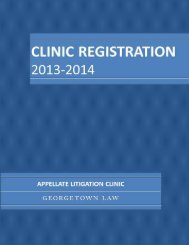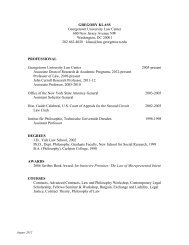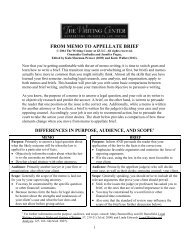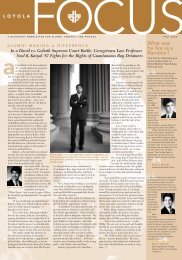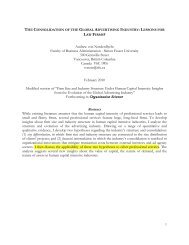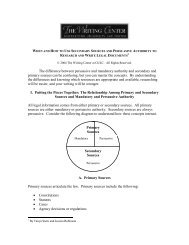Date: April 12, 2013 Topic: The Shrinking ... - Georgetown Law
Date: April 12, 2013 Topic: The Shrinking ... - Georgetown Law
Date: April 12, 2013 Topic: The Shrinking ... - Georgetown Law
Create successful ePaper yourself
Turn your PDF publications into a flip-book with our unique Google optimized e-Paper software.
General Counsel with Power? 2011 <br />
Within this sector of the market, some of the trends are quite clear: GCs want to secure ‘more for less’, <br />
more legal service at less cost; and most are wrestling, but doing so tentatively, with various new ways <br />
of sourcing legal services. <br />
Two divides also emerge. First, there is a stark contrast between the conservatives who see the future as <br />
a mildly finessed version of the past; and the radicals, who anticipate and are implementing major <br />
change in the way that legal services are delivered. Second, there is the split between those GCs who <br />
argue that external law firms are best motivated by urging them to compete with one another and those <br />
who believe that law firms will be individually and collectively more productive and efficient if <br />
encouraged to collaborate. <br />
Issues <br />
My own interest has always been in change. I am not a dispassionate observer. I believe lawyers must <br />
modernize -‐ to survive in law firms and to meet the needs of clients. One issue that currently interests <br />
me is who these agents of change might be. From the transcripts of Professor’s Sako’s interviews, it is <br />
clear that some GCs think they themselves should drive innovation; but a larger proportion think that <br />
law firms should be leading the way. Many law firms seem hesitant about this. Yet, in the history of <br />
industry and commerce, customers or clients have rarely redefined the services they receive or the <br />
markets of which they are part. That is the job of the provider. <br />
<strong>Law</strong> firms, generally, have always been reluctant to change. As I like to point out, or did at least until <br />
2007, it is hard to convince a room-‐full of millionaires that their business model is broken. And it is <br />
tougher still to compel managing partners to innovate radically when they have only two years or so left <br />
in post; their understandable inclination, rather, is to squeeze more out of the existing model and keep <br />
the figures looking rosy. In the long run, this thinking will be to the detriment of law firms. <br />
But, of course, the providers in the legal market are no longer just the law firms. As this report shows, <br />
there are new players in the legal game, not least the legal process outsourcers. I believe we will also <br />
see the resurgence into the legal sector of the large accounting firms, as well alternative business <br />
structures fuelled by private equity. <strong>The</strong>se new providers tend to have much greater appetite for <br />
rethinking legal services than conventional law firms. <strong>The</strong> competition is stiffening. In the end, then, the <br />
agents of change may not be lawyers. <br />
Another issue that flows from this report concerns the discipline that I call ‘legal process analysis’. This is <br />
the job of analyzing legal requirements (of an individual matter or of an entire business) and specifying <br />
the most efficient way of sourcing the legal work, consistent with the level of quality needed. Following <br />
the terminology of one of the interviewees, the question here is -‐ who should the architects (the process <br />
analysts) be? I worry about those GCs who immediately see this as a role for law firms. Surely, <br />
shareholders and directors of business can reasonably expect that their own in-‐house lawyers are the <br />
people ideally placed to assess legal problems and identify the best way to sort them out. <br />
27 <br />
Said Business School | University of Oxford




